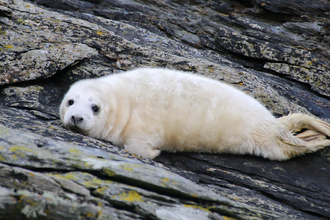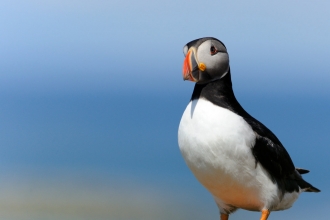
State of Nature 2024 - Conclusions
Despite the many deficiencies in data concerning the health of the Manx natural environment as outlined in this report, it is clear that our natural environment faces many challenges, both local and global, which can be summarised as:
Although the specific pressures on our native species and habitats may vary, the greatest threats to all Manx nature are:
- a rapidly growing human population - noting that the IOM Government’s ambition to increase our human population to 100,000 people by 2037 represents the most rapid population expansion in recorded Manx history.
- loss or change of habitat (including through destructive agricultural and fishing techniques)
- climate change
- inappropriate development
- invasive non-native species.
Our terrestrial environment
The rapid departure from centuries old, traditional land management techniques combined with the development of more efficient, human-made materials has resulted in the loss of many of the habitats on which our birds, invertebrates and small mammals depend. Losses have included wetlands, sand dunes, saltmarsh, river-side habitats, marshy grassland, curragh, old pastures, hedgerows and field boundaries and species-rich wildflower hay meadows which have largely been replaced with early-cut, monoculture silage.
The widespread use of damaging pollutants such as pesticides and fertilisers is evident in our land and rivers and has subsequent impact on our seas.
Our marine environment
We are fortunate to have a thriving and well-regulated fishery, however, our fishery is dependent upon highly destructive bottom trawling techniques. Irresponsible fishing can have a huge impact on our marine environment and the indiscriminate fishing techniques currently used deplete both target and non-target species of fish as well as all the other marine life which inhabits the seafloor. This can have significant impact on abundance and genetic diversity of surviving populations as well as the dynamics of all associated food webs and can take decades to recover.
Climate Change
It is essential that we understand the effects of climate change if we are to manage and mitigate its impact. There is already significant evidence that warming seas, reduced oxygen, ocean acidification and sea-level rises are affecting the Irish Sea coasts, with impacts on plankton, fish, birds and mammals.
Climate change and specifically rising sea temperatures also pose a serious threat to zooplankton and the phytoplankton, which are the basis of all marine ecosystems. Surface sea temperatures recorded now are higher than ever before, resulting in sightings of unusual species in Manx waters such as bluefin tuna and swordfish. This is just a hint of the impacts of climate change on biodiversity and the marine environment that we can expect. Acidification of marine waters will have impacts on shellfish, including our commercial species (scallops, lobsters, crab and whelk) and affect four of our main fisheries. Although most of our marine macro-species (whales & dolphins) have broad geographic ranges and are therefore able to tolerate changes in water temperature, their prey such as fish and squid are much less adaptable to changes in sea temperature, which dramatically affects their abundance and distribution.
Opportunities for recovery
Although evidence of the decline in Manx nature is clear and concerning, we have opportunities to help preserve the habitats we have, restore those that are in turmoil and to prevent further loss of biodiversity both on land and sea.
- By improving the quality and amount of protected terrestrial and marine areas we have will give nature the chance to recover for itself. Our nature reserves work very well to protect areas of rare and important habitat and can help species survive in small areas, promoting wider population growth.
- Creation of larger, multifaceted, mosaic habitats comprised of scrub, ponds, rough hedgerows and mixed flora, through proper land and sea management and rural and urban conservation projects will give our native wildlife space and diversity of environment in which to thrive.
- Reducing pollution of our land and water courses (mostly through the use of pesticides and fertilisers) will reduce pressure on our terrestrial flora and fauna species.
- Careful review of fishing techniques to minimise the use of destructive methods, such as dredging, to prevent the critical loss of marine biodiversity.
- Development and implementation of climate change strategies with nature at the forefront, to build resilience to current and future climate pressures on both habitats and species.
- Thorough and swift management for our biosecurity and the identification, management and where necessary eradication of invasive and non-native species that pose threat to our Manx species.
- Balance of development, economical, logistical and recreational use of our wild spaces on land and sea with the requirements of our natural world.
- Identification of the gaps in our knowledge and response to gain missing information so that we do not experience further loss of species before we even know what species we have!
- Continuation and development of targeted species recovery plans and projects such as Action for Wildlife, robust fisheries measures and the Agri-Environment Scheme to support our species, our communities and our farmers and fishers.
Tools for success
Manx Wildlife Trust recognise that we are a small Island nation, which while being comparatively wealthy on a global scale, also faces very limited resources. To address the many challenges recognised by Manx State of Nature, and to address the twin climate and biodiversity crises which Tynwald have recognised, we need to:
- Achieve ’30 by 30’: ensuring that 30% of both or land and seas are effectively conserved and managed through ecologically representative, well-connected and equitably governed systems of protected areas and other effective area-based conservation measures, including through Biodiversity Net Gain in the planning process, the designation of Marine Nature Reserves and Areas of Special Scientific Interest and the maturation of the Agri-Environment Scheme.
- Improve and strengthen the Wildlife Act, and significantly increase enforcement and education.
- Use our limited resources wisely, targeting action on the species and habitats which will result in the biggest wins for nature.
- Target coordinated action against invasive, non-native species which pose the greatest ecological threats, noting that the soon such issues are dealt with (or ideally prevented in the first place), the cheaper and easier they are to manage, with the least environmental impact.
Thank you
Thank you for your interest in Manx State of Nature. The challenge before us is huge, however we know what we need to do, and how we need to do it to turn the tide for nature, both on land and at sea. You can help us in this endeavour by becoming a member, ensuring that your voice is added to a growing call for more resources for nature conservation and nature’s recovery on the Isle of Man. Gur amie ayd.



